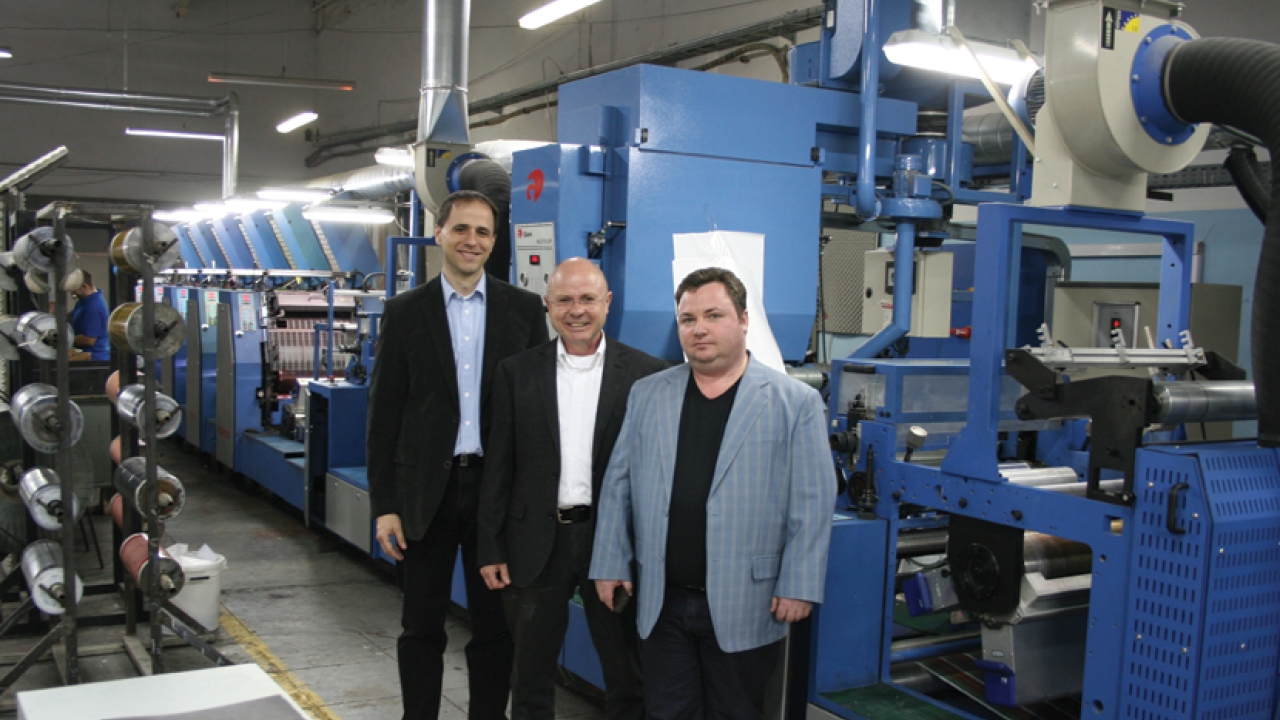Marzek Group invests in Eastern promise

With growing operations in Austria, Hungary and Ukraine, the Marzek group of companies is investing heavily in becoming a major pan-European player. Andy Thomas reports
Austria-based label and decorative packaging converter Marzek Etiketten has become a major pan-European player with the acquisition of plants in Hungary and Ukraine, and is currently in the middle of an 11 million euro investment program to boost productivity and efficiency across the group’s operations.
The Marzek group today has a turnover of 50 million euros and 500 employees across Europe. Its eastward expansion began with the acquisition of Kner Packaging in Hungary in 2005, an offset converter of both cartons and wet glue labels. In a significant investment, the Hungarian operation will now take delivery of a new Heidelberg CX105 press, equipped with UV and aqueous coating. Additionally, Marzek has started a roll-fed operation at the plant.
Marzek made its first move into the Ukraine as early as 2000, when it entered into a profitable joint venture with a local converting group, which ended in 2005.
This time the deal gives Marzek the major share in a joint venture with Pechatny Dvor, one of Ukraine’s leading packaging printers based in the city of Dnipropetrovsk.
The deal keeps on board the highly entrepreneurial CEO of Pechatny Dvor, Dimitry Nudel, who started his graphic arts career selling carbonless paper before recognizing a growing demand for multi-color commercial printing. His first press was a Ryobi, which is still running. ‘I then decided that labels and flexible packaging were more profitable,’ says Nudel.
To take full advantage of the growing Ukrainian consumer market and to promote exports to Central Europe, Nudel needed significant investment, so the approach by Marzek was well timed. The JV agreement was signed in 2009.
‘Mr Nudel’s strengths are spotting new packaging opportunities in the Ukraine,’ says Marzek Group CEO Johannes Michael Wareka. ‘He has a fantastic eye for market niches.’
The first year of the JV was a great success, with the new company growing over 30 percent. ‘We expect the same this year,’ says Michael Wareka.
There are estimated to be only some 30 specialist label converters in Ukraine. ‘There is a lot of potential, but the market still grows more slowly than it could,’ says Dimitry Nudel. ‘But with the Marzek connection we have the possibility to export to Central Europe. We are an international group and can serve customers locally where they need to be served.’
Current per capita consumption of PS labels in Ukraine is around 2.8 sq meters, which compares to over 12-13 sq m per person in Central Europe. ‘We are partly creating a market where today there is still a lot of cheap quality direct print,’ says Michael Wareka.
The company’s customers are both Ukrainian and global brands – with the business tilting towards international companies – across a diverse range of sectors from food and dairies to wine labels. ‘There is a significant wine industry in Ukraine and the Krim region is particularly famous throughout the region for its sparkling champagne-like wines,’ says Michael Wareka.
Marzek’s current two-year group investment program includes powerful support for the rapid growth of the narrow web business at Pechatny Dvor. The existing plant is overwhelmingly a sheetfed operation, with multiple Man Roland 300 offset presses and Heidelberg Speedmasters and plates provided by a Kodak Magnus CTP unit.
But the narrow web business was already growing in importance before the Marzek acquisition. Dmitri Nudel had installed a raft of finishing equipment including a Focus Reflex and multiple rewinders, as well as a highly specified Rotatek Perfect press.
The Rotatek Perfect is a fully modular shaftless rotary offset press, and this installation was the first to combine gravure, offset and flexo. The gravure unit is mainly used for whites and metallics, while the six UV offset and two flexo coating units can be switched between solvent, waterbased and UV drying. Web width is 520mm and when L&L visited the plant the Perfect press was printing roll to roll at speeds up to 200 m/min. The machine is configured with E+L web guide, Eltromat color control system, Arcotec corona treater and IST UV.
Marzek subsequently installed a Gallus TCS250, a second Rotatek Perfect press with almost exactly the same configuration, and additional finishing and embellishing equipment. ‘We worked closely with Rotatek technicians on the press and they took on board our suggestions,’ says Michael Wareka.
The two Rotatek presses convert a wide range of labeling and packaging substrates including shrink sleeve labels, wraparound labels, monofoils and aluminium laminates.
‘We have already printed films down to 12 microns,’ states Dimitry Nudel proudly. ‘Rotatek did not believe this was possible – before they quoted 20 microns as the thinnest materials for this press.’
The Perfect presses can be equipped with a sheeter module which allows wet glue labels, among other things, to be printed. A unique roll-fed application is decorated ice cream cones, for which Pechatny Dvor is the biggest supplier in the country and is now moving into the Russian market.
‘When we have our new lamination capacity we will move more towards packaging on these presses,’ says Michael Wareka. ‘We do not want to compete head to head with the gravure printers, but instead to produce niche, short and medium runs of packaging. We are confident we can match
gravure quality.’
The lamination capacity that Wareka refers to is now being commissioned. ‘First we started at the beginning of the learning curve,’ says Wareka. ‘Our staff are highly ambitious and we are advancing very fast, already having developed a high level of knowhow.’
Marzek is also looking to upgrade Pechatny Dvor’s sleeve seaming/inspection system. ‘We are about to invest in a faster line, as we also see shrink as one of our opportunities for growth,’ says Wareka.
With consolidation of converting groups across Europe now a key trend, the Marzek group is well positioned to take advantage of the service it can now offer to pan-European label and packaging buyers.
Labor equation
To what extent is the decision move into a developing economy about relative labor costs? ‘A good manager here in the Ukraine costs more than in Western Europe,’ says Marzek’s Michael Wareka. ‘But there is a bigger gap between manual labor, and this means production costs overall are cheaper than in Austria. Hungary has an average 25 percent of the production-personnel costs per capita in Austria, and Ukraine has half the personnel costs of Hungary. The ratio would be 100 (Austria), 25 (Hungary) and 15 (Ukraine). Of course the productivity is still quite different, but in addition people here (in Ukraine) are highly motivated and there is more long-term growth potential.’
Pictured: (l-r) Alexander Schneller-Scharau, head of technology and sales at Marzek group, Dr Johannes Michael Wareka, CEO Marzek group and Dmitri Nudel, CEO of Pechatny Dvor standing in front of the Rotatek Perfect press at the Pechatny Dvor plant in Ukraine
This article was published in L&L issue 4, 2011
Stay up to date
Subscribe to the free Label News newsletter and receive the latest content every week. We'll never share your email address.


